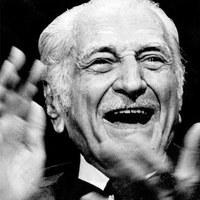Recife (Brasil), 1900 – 1987
By Carlos Eduardo Martins
One of the leading Brazilian writers and essayists, Gilberto Freyre was born in Recife, Pernambuco, into a traditional family that owned sugarcane plantations. His father, Alfredo Freyre, was a judge and professor of political economy at the Recife Law School. Enrolled at the age of eight in the kindergarten of the American School, he initially had difficulties reading and writing. He learned English before his mother tongue and later studied Latin with his father, organizing the literary society and the school newspaper, O Lábaro, where he published his first articles. At fifteen, he began studying French and read the classics of literature in French, Latin, Spanish, English, and Portuguese.
In 1920, he earned a bachelor’s degree in arts from Baylor University, and in 1922, he completed a master’s degree in Social Sciences at Columbia University, New York, presenting the dissertation Social life in Brazil in the middle of the nineteenth century. He was a student of the great American anthropologist Franz Boas, from whom he learned to separate the concept of culture from biological and racial influences. Boas, along with Manuel de Oliveira Lima, historian of King João VI, were his main influences, alongside other figures of American thought such as Franklin Giddins, John Dewey, and Alfred Zimmern.
His writings in English impressed Joseph Armstrong, his professor at Baylor University, who suggested he naturalize as a citizen to benefit from a coveted scholarship at Oxford. But Freyre refused and proposed instead to be a writer in Portuguese. In 1922, he traveled to Europe, passing through Paris, Berlin, Munich, Nuremberg, London, Oxford, and Lisbon. He returned to Brazil in 1923 and the following year organized the Regionalist Center of the Northeast, defending local values against the modernist offensive. Opposing the 1930 revolution, he moved to Lisbon.
In Portugal, he began working on what would become his most important contribution to Brazilian culture: the history of the country’s patriarchal society. The first volume of this endeavor was Casa-grande & senzala (The Masters and the Slaves), completed in 1933 in Recife. He continued with Sobrados e mucambos and Ordem e progresso. He never wrote Jazigos e covas rasas as he had intended.
He was elected federal constituent deputy in 1946 for the National Democratic Union (UDN) and created the Joaquim Nabuco Institute for Research. In 1950, he became director of the Regional Center for Educational Research in Recife and advocated for educational policies attentive to regional diversities. In 1951, he was invited by the Portuguese government under António Salazar to travel to Cape Verde, Guinea, Goa, Mozambique, Angola, and São Tomé, from which he developed the concept of Luso-Tropicalism, already implicit in writings like Casa-grande & senzala, but later elaborated in works such as Aventura e rotina and O luso e o trópico.
O luso e o trópico praised the Portuguese colonial work, capable of creating a borderless identity that crossed the seas and adapted to the tropics, forming diversities that would constitute one Portugal. Luso-Tropicalism would have survived the fall of the Portuguese colonial empire and was claimed by movements such as the Community of Portuguese Language Countries. In 1964, he supported the military coup. He was part of the Federal Council of Culture from its inception in 1967 during the government of Marshal Castelo Branco. He died in 1987, leaving behind a vast body of work, including 67 books and hundreds of other documents.



